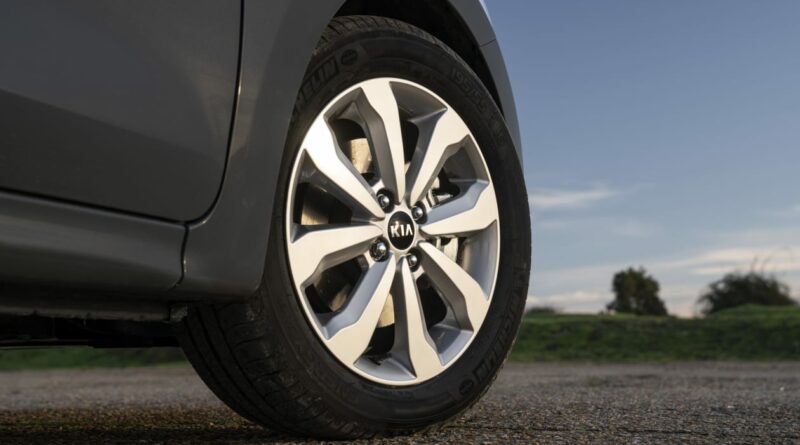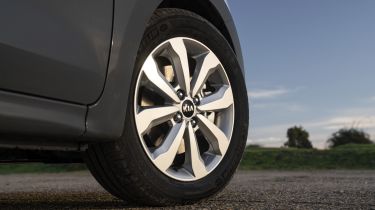Wheel bearing noise – what causes it and what to do?
If your wheel bearings are noisy they could be worn out. Here’s all you need to know about them
If you’re driving along and notice a rumbling or grinding noise coming from one of the corners of the car or your steering feels more wobbly than normal, it’s possible you have a faulty or worn wheel bearing. If your tyres are wearing unevenly then this could also be a warning sign, although this is also associated with other more common issues such as under/over inflated tyres or incorrect wheel alignment.
There’s no need to worry if you think you have a worn wheel bearing, as these parts are not expensive to buy nor will it take an experienced mechanic much time to get one changed. Our guide explains everything you need to know about wheel bearings and what to do if they are faulty.
What are wheel bearings?
Right in the middle of your car’s wheel is what’s called the hub. It’s what the wheel itself attaches onto with your wheel nuts (or bolts) and it turns as the wheel does. Inside the hub is a wheel bearing, which is what allows the wheel to be both attached to the car and to rotate at the same time. It’s a small assembly of metal parts that slide along easily, helped with grease.
-
Tyre pressures and tread depths: your tyre safety check guide
Hardened metal is used to make wheel bearings and they are very strong – easily able to handle the car’s corner weight. They last a long time, but on older cars or ones with high mileage, they are still something that is susceptible to wear, just like brakes or a clutch.
What causes wheel bearing noise?
The metal inside the bearing can wear down and start to fail, usually making a noise when it does so. This is often accelerated when dirt, grit or sand gets into the bearing if the seal is compromised, or if the grease inside comes out for the same reason.
Since the noise from a worn bearing won’t suddenly arise, it might be hard to tell – but if someone else rides in your car they might notice the noise straight away because they haven’t gotten used to it yet. Either way you will usually be made aware of the issue at MOT time or when getting your car serviced by a mechanic.
If you can hear it, the noise is likely to be a grating, grinding or rumbling which changes with the road speed and doesn’t change when you blip the throttle or dip the clutch.
-
How to change a car tyre
You may also notice a clicking noise and perhaps a vibration through the steering wheel, caused because the worn bearing allows the wheel to wobble. If you are at this stage, it’s really time to get it fixed as it will affect the handling of the car.
To do a DIY diagnosis, you’ll need to jack the car up and spin the wheels individually to see which one is noisy. It’s also worth rocking the wheel from side to side and up and down to check for clonks and movement.
How to fix wheel bearing problems
If you want to attempt a fix on a noisy wheel bearing yourself, check a workshop manual or online guide for instructions. You may find you can just pack the existing bearing with grease and tighten it up, especially on older cars. If you need to replace parts, think carefully before you attempt it yourself as you’ll need some pretty serious tools to undo seized nuts and press out the bearing.

The price of parts will depend on all sorts of factors, but you might be pleasantly surprised as the same bearings might be used across many different cars. Online suppliers are likely to be cheaper than a dealer or motor factor, but make sure they’re reputable as fake branded car components are worryingly common. Also make sure you are ordering the right part – there can be a bewildering array of bearings, with differences existing even across the same model and production year of car.
If you are struggling to find the right part – for example with a classic or specialist car – it will be worth checking a directory to see if there is a bearing supplier near to you. These businesses will usually have a counter where an expert will be able to identify a part by sight – and they’ll be cheap too.
However you fix them, it’s essential to get your bearings repaired if they are noisy or worn. If you just turn up the radio and ignore the rumbling they will damage and wear other, more expensive components, burn more fuel, and could even be a safety issue.
Want the latest car news in your inbox? Sign up to the free Auto Express email newsletter…
Source: Read Full Article



 Tyre pressures and tread depths: your tyre safety check guide
Tyre pressures and tread depths: your tyre safety check guide How to change a car tyre
How to change a car tyre

